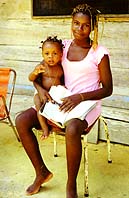Aukaners
 The Aukan
tribe is the largest tribe living in the rainforest of Suriname.
This group of people live along the Marowijn, Tapanahoni, and
Cottica Rivers in Suriname. Aukaners are the descendants of runaway
slaves or maroons who fled into the rainforest of Suriname. There
they found help from the Amerindians, who also viewed the Dutch
as potential enemies. The Aukan
tribe is the largest tribe living in the rainforest of Suriname.
This group of people live along the Marowijn, Tapanahoni, and
Cottica Rivers in Suriname. Aukaners are the descendants of runaway
slaves or maroons who fled into the rainforest of Suriname. There
they found help from the Amerindians, who also viewed the Dutch
as potential enemies.
Suriname was established in the late 1600s as a slave colony.
In 1706 there were 10,735 people in Suriname (not counting the
Amer-Indians), 9988 African slaves and 747 whites. Some slaves
escaped. In 1712 tax-collectors arrived from Europe and the slave
owners sent their slaves into the jungle to hide them. Almost
700 of these slaves never returned. As more and more slaves escaped,
they began to organize themselves into six different tribes:
the Ndyuka, the Saramaka, the Matawai, the Paramaka, the Kwinti,
and the Aluku. The Aukan nation comes from the Ndyuka group of
escaped slaves.
|



